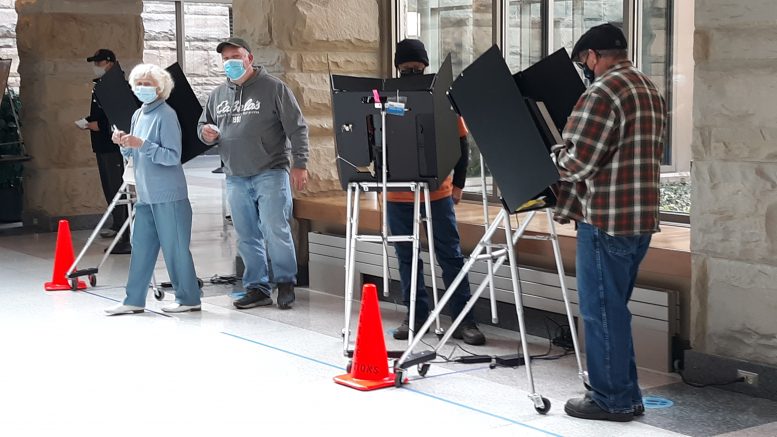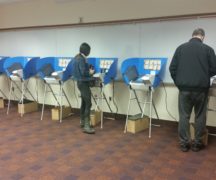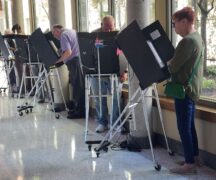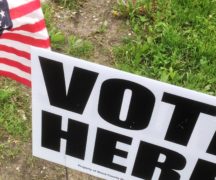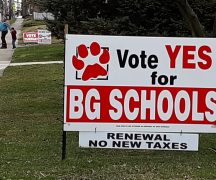By JAN LARSON McLAUGHLIN
BG Independent News
Election boards throughout Ohio are being flooded with massive public records requests – though no credible claims have been made about problems with the 2020 General Election in Ohio.
Wood County Board of Elections has received six such requests for the 2020 election records, according to Director Terry Burton.
The “extensive” requests cover an estimated 125 boxes of records, Burton said Friday morning.
The six records requests submitted to the Wood County Board of Elections are identical aside from the names of the people seeking the records.
“They’ve copied and pasted the content,” Burton said. The names attached to the requests are Alyssa Behm, Jill Dimel, Patrick Baker, Catherine Hayes, Carly Oborn, and JT for CitizenState.
“None of these individuals, to our knowledge, are from Wood County,” Burton said.
It’s not unusual for the elections board to get public records requests. However, the requests are usually made soon after an election and do not cover such extensive materials, Burton said.
Wood County is not alone. According to the Statehouse News Bureau, despite no credible claims of problems with the November 2020 vote in Ohio, dozens of huge requests for voting records are being filed with county elections officials.
Delivering on those could mean more work and costs for those boards and obstacles for workers, who are already dealing with a challenging election year.
The records requests will be a burden for the Wood County Board of Elections.
“When you’re talking about a public records request of this number, it is daunting,” Burton said. “We just don’t have the manpower and the time.”
The local board also doesn’t have the technology to convert the paper records into an electronic format. So the elections office is seeking quotes from outside companies that have the technology and staffing needed.
The six records requests to Wood County ask the board of elections to be mindful of the costs.
“In order to reduce the potential costs for this request, I ask that all records be produced in electronic form whenever possible. Please notify me in advance if the fees exceed $20 for this request,” the letters state.
That won’t come close to covering the expense.
Governmental entities are allowed to bill for records requests. In this case, converting 125 boxes of paper records into an electronic format could cost “multiple thousands of dollars,” Burton predicted.
The six records requests received by Wood County Board of Elections ask for the following records from the 2020 election:
- All ballots.
- Central Committee notices.
- Correspondence to or from the Ohio Secretary of State’s Office.
- Pollbooks, poll lists and related materials.
- Poll officials record/precinct record.
- Change of name, deaths, and disenfranchised voters report.
- Elector application for correction or challenge form.
- Absentee identification envelopes.
- Voter verified paper audit trail.
- Voting machine reports.
- Chain of custody form and voting unit event log.
- Challenge forms.
Ohioans cast a record 5,974,121 ballots in the 2020 general election, which was 73.99% of registered voters in Ohio. So the requests asking for copies of all ballots and the results tapes that voting machines recorded twice a day, can be up to 70 feet long each.
According to the Statehouse News Bureau, voting materials from the 2020 election were set to be destroyed 22 months after that vote, which would be next month. The records will be kept for now – which could create storage issues for some boards. Some boards may have to hire extra personnel to do the work if they have to provide all of the records that have been requested.
There’s never been a dispute over Ohio’s election results. Secretary of State Frank LaRose said earlier this year there were 62 potential cases of fraud out of 5.9 million votes cast in the November 2020 election – half involve people who are non-U.S. citizens who registered to vote and another 27 cases involve people who allegedly cast a 2020 General Election ballot illegally.
LaRose announced this week 11 people were referred to Attorney General Dave Yost for further investigation of potential election law violations. The referrals include 10 non-citizens who registered to vote but did not cast a ballot and one non-citizen who may have voted illegally.
Boards of elections in other states are also reporting a flurry of lengthy public records requests from the 2020 vote, including North Carolina, Nevada and Arizona, where election deniers have been actively trying to overturn the 2020 results.

